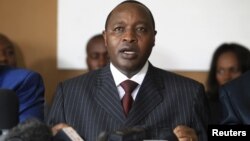KAMPALA —
Peace talks between the government of the Democratic Republic of Congo and the M23 rebel group have officially resumed. The restart came days after the rebels announced they would proceed with the dialogue even if the government did not agree to a ceasefire in the disputed area of eastern Congo.
The talks, which originally began in December, were suspended for the Christmas holidays. The two sides had earlier failed to resolve the conflict that erupted in eastern Congo last year.
Organizers said the restart of the talks, originally scheduled for last week, was delayed by sanctions the United Nations Security Council brought against the rebel group at the end of last year. The U.N. imposed an arms embargo on the group and banned travel and froze the assets of two of M23’s leaders.
Ugandan Defense Minister Crispus Kiyonga, who is mediating the dialogue, said the
delegates have now received assurances from the U.N. that the talks can continue as long as none of the sanctioned rebels are involved.
The move by the U.N., announced on New Year’s Eve, took the leaders of the peace talks by surprise, he said.
“We would have preferred, as the region, that those who impose sanctions should coordinate with those who are pushing dialogue and peaceful resolution. But we haven’t yet agreed on coordination. To some extent it is disruptive to emphasize sanctions when parties are willing to undergo a dialogue,” said Kiyonga.
Kiyonga said both parties remain committed to the peace process, despite earlier concerns it might be falling apart. One sticking point has been the rebels’ insistence that the government agree to a unilateral ceasefire in the disputed region. Earlier this week M23 delegates announced they would adhere to the ceasefire.
M23 delegation leader Francois Rucogoza told the press conference the rebels would continue to participate in the talks, even if the Congolese government did not agree to the ceasefire.
Kiyonga said there had been no update on the agreement. But he has ordered investigations into reports of violence in areas of eastern Congo. “There have been some reports in the field around Goma and eastern DRC that there are some violations of the cessation of hostilities. I have asked the commander of the Joint Verification Mechanism to investigate and let me know,” he stated.
There is no timetable on the talks, but Kiyonga said the agenda is nearly finalized. The talks will now focus on four clusters, including reaching a peace deal, security issues and monitoring and evaluation of any agreements.
The talks, which originally began in December, were suspended for the Christmas holidays. The two sides had earlier failed to resolve the conflict that erupted in eastern Congo last year.
Organizers said the restart of the talks, originally scheduled for last week, was delayed by sanctions the United Nations Security Council brought against the rebel group at the end of last year. The U.N. imposed an arms embargo on the group and banned travel and froze the assets of two of M23’s leaders.
Ugandan Defense Minister Crispus Kiyonga, who is mediating the dialogue, said the
delegates have now received assurances from the U.N. that the talks can continue as long as none of the sanctioned rebels are involved.
The move by the U.N., announced on New Year’s Eve, took the leaders of the peace talks by surprise, he said.
“We would have preferred, as the region, that those who impose sanctions should coordinate with those who are pushing dialogue and peaceful resolution. But we haven’t yet agreed on coordination. To some extent it is disruptive to emphasize sanctions when parties are willing to undergo a dialogue,” said Kiyonga.
Kiyonga said both parties remain committed to the peace process, despite earlier concerns it might be falling apart. One sticking point has been the rebels’ insistence that the government agree to a unilateral ceasefire in the disputed region. Earlier this week M23 delegates announced they would adhere to the ceasefire.
M23 delegation leader Francois Rucogoza told the press conference the rebels would continue to participate in the talks, even if the Congolese government did not agree to the ceasefire.
Kiyonga said there had been no update on the agreement. But he has ordered investigations into reports of violence in areas of eastern Congo. “There have been some reports in the field around Goma and eastern DRC that there are some violations of the cessation of hostilities. I have asked the commander of the Joint Verification Mechanism to investigate and let me know,” he stated.
There is no timetable on the talks, but Kiyonga said the agenda is nearly finalized. The talks will now focus on four clusters, including reaching a peace deal, security issues and monitoring and evaluation of any agreements.




